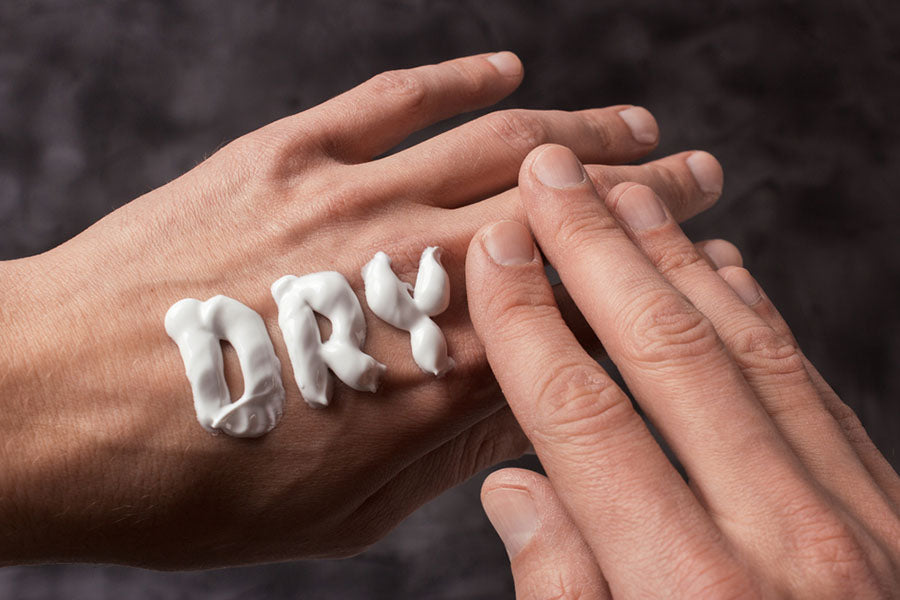What Causes Dry Skin?

By ADragan / Shutterstock.com
Even people who struggle with oily skin during the hotter months often find their skin drying up during the wintertime. In this guide, we explain how to tell if you have dry skin, the various causes of dry skin, and how to treat dry skin at home before it becomes too severe.
What Does Dry Skin Feel Like?
Dry skin, formally known as xerosis or xeroderma, can occur anywhere on the body. It commonly appears on the hands and face but can also occur on the arms, legs, torso, feet, and pretty much anywhere else. Dry skin can typically be identified visually due to its rough and flaky appearance. More advanced dry skin can lead to scaling, cracking, and peeling, and may even result in bleeding. Dry skin also feels tight, and may make it difficult to move your hands or make facial expressions in severe cases. It may also result in patches of skin with a different color than normal. Fair skin may look red or pink while darker skin may look gray or ashy.
Browse Our Moisturizing Skincare Products

By Prostock-studio / Shutterstock.com
What Causes Dry Skin?
The underlying causes of dry skin are usually either a loss of water moisture or not enough oil (sebum) production — and sometimes both. Some people’s skin tends to be naturally dry already, and your skin tends to become more dry as you age as well, especially after you hit 40.
There are many other environmental factors that can also cause dry skin. Exposure to harsh, cold weather is a major one, which is why many people experience dry skin in winter. Spending lots of time in the sun will worsen dry skin, especially if you get sunburned. Doing wet work that constantly requires you to expose your skin to water — such as nurses washing their hands all the time — will also contribute to dry skin.
Certain health conditions also contribute to dry skin. Having a vitamin deficiency such as vitamin D, vitamin A, niacin, zinc, or iron can lead to dry skin. Dry skin is also a known side effect of diabetes, thyroid disease, kidney disease, dialysis, and certain cancer treatments. Many conditions that affect the skin also cause dryness as a side effect including atopic dermatitis, ichthyosis, perioral dermatitis, psoriasis, and seborrheic dermatitis.

By Geinz Angelina / Shutterstock.com
How to Treat Dry Skin
Most cases of dry skin are very mild and caused by environmental factors, making it very easy to treat at home. However, if you suspect that your dry skin is caused by an underlying medical condition or a nutrient deficiency, reach out to your medical provider to treat the underlying problem. If left untreated, dry skin can eventually lead to skin cracking and bleeding, so it’s important to take care of dry skin when you notice the early symptoms.
If you’re experiencing dry skin, we recommend going through your skincare collection and temporarily hitting pause on products that contain potentially drying ingredients. These include acne skincare products, facial exfoliators with acids, and other products meant for oil control. Once you’ve got your dry skin under control, you can slowly add these back into your routine if you feel like you need them. Be careful not to use exfoliators too often, though. We know it’s tempting to use them constantly in order to remove all the dry flakes, but if you overdo it, then you will just dry your skin out further and make the problem worse.
For now, focus on using gentle facial cleansers that won’t strip your skin’s natural oils, and then follow it up with hydrating serums and heavy moisturizers that will help to lock in that water and keep it from escaping your skin. Search for products that are marketed for dry, sensitive, and/or dehydrated skin, and look for terms like “milk cleanser” and “night cream” which indicate products with a thicker texture that aren’t drying. If you have very dry skin, you might want to finish off your skincare routine with a hydrating oil or even a layer of petroleum jelly (a technique called “slugging”) to really seal everything in. Be aware that these thicker products might not absorb into your skin fully, so you’ll want to do this at night and sleep on an old pillowcase that you don’t mind staining. You should also continue to wear sunscreen during the day, even during cloudy winter weather, because UV ray exposure contributes to dry skin and can make the problem worse.
Ready to give your skin the hydration and moisture it needs? Shop our dermatologist-developed skincare from Dr. Harold Lancer to give your dry skincare routine a boost for winter. Get free, fast shipping on all U.S. orders!
 PREVIOUS (How to Get Rid of Puffy Eyes Fast)
PREVIOUS (How to Get Rid of Puffy Eyes Fast) NEXT (What Causes Adult Acne?)
NEXT (What Causes Adult Acne?)